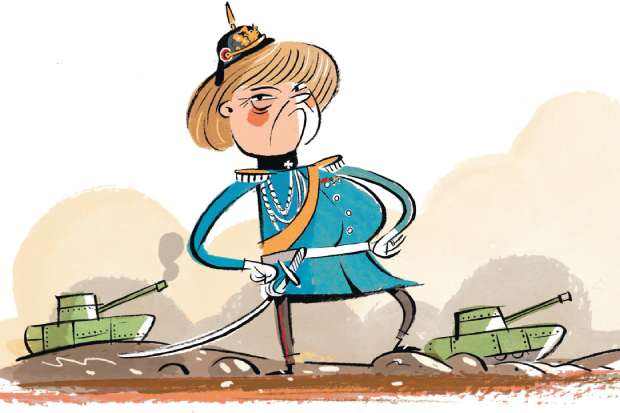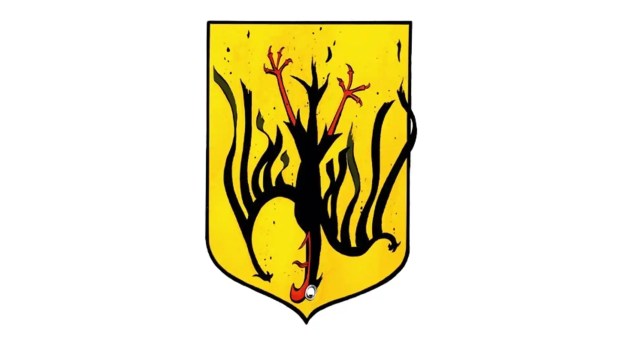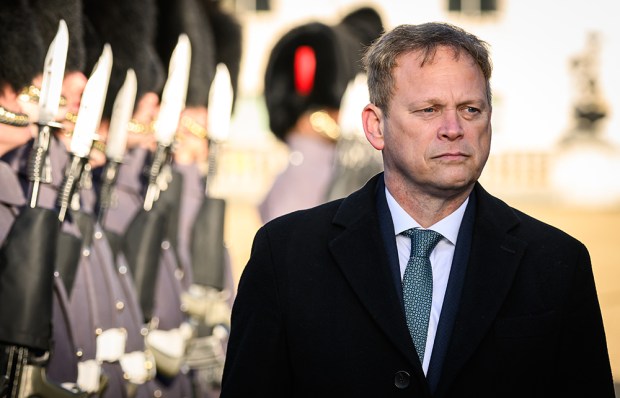In the old Death Strip between East and West Berlin, which runs through the centre of the city, there is a graveyard full of German war heroes and a few war criminals too. From the Red Baron to Reinhard Heydrich, the best and worst of the German military are buried here. There’s also a mass grave full of civilians, killed by Allied air raids, and a memorial to the 136 East Berliners who died trying to cross the Berlin Wall — which ran through this cemetery. The Death Strip is still an empty space.
Germany has been marking two anniversaries this year — one a celebration, the other a painful duty. The 25th anniversary of the Mauerfall (as Germans call the fall of the Berlin Wall) is one of those rare events in German history about which they can feel unequivocally happy. The centenary of the first world war is, naturally, a lot more awkward. There’s scant affection here in Germany for the monocled militarists who led the Second Reich to destruction, but a hundred years after Kaiser Wilhelm invaded Belgium the jackboot is on the other foot. Now the Germans are the good guys, the financial saviours of a debt-ridden continent — and Europe’s shared security looks increasingly uncertain in the face of Russian militarism. Its former foes are now wondering if she might be persuaded to flex her muscles once more.
Anders Fogh Rasmussen, the former Nato secretary general, has been among the considered voices calling for Germany to start punching its diplomatic weight. ‘Germany is a normal country today, with the kinds of rights and duties other countries have,’ he said earlier this year. ‘That is why Germany should play an important role in foreign and security policy, be it in the EU, Nato or in international politics.’ Rasmussen used to be prime minister of Denmark, one of the (many) countries occupied by Germany during the second world war, so his comments carry extra clout.
It’s well established by now that America’s attentions are turning east, towards the Pacific Rim and the looming strategic clash with China. Uncle Sam will not always have Europe’s back. The Obama administration wants Europe to take more responsibility for its own defence, but Britain has been cutting back its forces and France is preoccupied with North Africa and the Middle East. Since the crash in 2008, Nato countries have reduced their defence spending by 20 per cent. Russia, on the other hand, has increased its military budget by 50 per cent. With Putin pushing westwards, and possibly menacing Nato states, Europe needs Germany like never before — not just as an economic power-house, but as a military presence too.
Europeans no longer fear Germany. But do the Germans still fear themselves? In Deutschland, a conservative country to its core, old habits die hard. Since its foundation, in 1949, the Bundesrepublik has harboured deep pacifist instincts. Its constitution forbade the use of armed forces for anything save self-defence. The atrocities of the Third Reich, in which the army played an active role, left Germans with a profound aversion to any sort of military adventure. Throughout the Cold War, and beyond, Germany (like Japan) practised a kind of chequebook diplomacy, providing financial and logistical support instead of troops. Helmut Kohl helped to bankroll the Gulf War but sent no soldiers. The Bundeswehr didn’t engage in foreign combat until 1999 (in Kosovo). As German statesman Hans-Ulrich Klose put it, Germany had become a ‘post-heroic society’.
Things are changing dramatically, however. For a long time after the second world war, the country was a military base for Britain and America. Before the Wall fell, there were 400,000 American troops in western Europe. Today there are 67,000. At the time of the last election, Britain had 20,000 troops in Germany — by next Christmas, barely a quarter will remain. That creates a vacuum. And with Putin reportedly boasting that Russian troops could be in five Nato capitals in two days, Germany’s unwillingness to exude hard power is starting to be a cause for concern. ‘A conquering army on the border will not be stopped by eloquence,’ said Bismarck in 1867. He might have been talking about Ukraine. The principle is a basic one: as Donald Rumsfeld once put it, weakness is more provocative than strength. And Europe at the moment looks dangerously tired and weak.
Now, despite initial reservations and opposition from German business, Angela Merkel is hardening her line against Russia, leading the drive for firmer EU sanctions. ‘The annexation of Crimea, in violation of international law, the military conflict in eastern Ukraine and Russia’s actions pose a direct danger to the European peace order,’ foreign minister Frank-Walter Steinmeier told the OSCE ministerial council in Basel last week. ‘The confidence that had been built up over decades has been lost within just a few months. We are now facing the greatest challenge since the end of the Cold War.’
It’s not just Russia which demands Germany’s attention. As the Middle East dissolves into chaos, she will be expected to play a role in the battle against the Islamic State. Steinmeier has ruled out joining Britain and America in air strikes, but he has pledged €70 million worth of arms to Kurdish forces fighting Isis in Iraq — and troops to train them. Back home, Germany has also banned public displays of support for Isis.
Combat missions are traditionally unpopular with German voters but recent polls suggest this could be changing. Surveys by German pollsters Infratest Dimap found that three in four Germans want their country to adopt a stronger diplomatic stance in international conflicts; four in five agreed that Russia was mainly responsible for the escalation of the current crisis in Ukraine. ‘Germany needs to step up and play its part,’ said Steinmeier recently. ‘Many of our international partners demand a more active foreign policy from Germany. And I think they are right.’
Steinmeier has assumed a more vigorous role in world affairs than his more cautious predecessor, Guido Westerwelle. Merkel’s new defence minister, Ursula von der Leyen, has made a similarly momentous start. Widely tipped as Merkel’s heir, she recently paid a surprise visit to Iraq to talk to Kurdish leaders about their struggle against Isis. Some 400 German nationals are believed to have travelled to Syria to join Isis — and if their experience is anything like Britain’s, half of them will have returned and be stirring up trouble at home. Germans are learning that isolation is not an option. You may not be interested in war, but war is sometimes interested in you.
Russia remains the main concern. Angela Merkel has always taken a tougher line towards Russia than Gerhard Schröder (who once referred to Vladimir Putin as a ‘flawless democrat’). Fluent in Russian, having grown up in the old East Germany, Merkel has often been regarded as the European leader who might understand Putin and be able to build bridges between East and West; Putin, for his part, speaks fluent German, having spent five years as a KGB officer in East Germany. Since the Crimean crisis, Merkel has hardened her position — calling for a full withdrawal of Russian troops from Eastern Ukraine.
Yet the inherent pacifism of modern Germany prevails. ‘Everyone here around this table knows that there will be no military solutions to this conflict, and no one wants such solutions,’ Steinmeier told the OSCE. ‘And so we will have to tread the difficult path of negotiation.’ When German President Joachim Gauck, a former Lutheran pastor, called for more rigorous diplomacy, he was called a ‘warmonger’. The accusation was absurd, but Willy Brandt’s 1970s Ostpolitik still resonates more than Bismarck’s 1870s Realpolitik. A recent poll found that 49 per cent of Germans want to adopt a neutral stance between Russia and the West with regards to Ukraine. The words of the Polish foreign minister (and Spectator contributor) Radek Sikorski now seem particularly apt. ‘I will probably be the first Polish foreign minister in history to say so,’ he said, in Berlin in 2011, ‘but I fear German power less than I am beginning to fear German inactivity.’
Wandering around Berlin, it’s hard to believe you’re in the capital of the most powerful country in Europe. Every time I come here, the city seems more laidback. ‘We won’t fight your imperialist war,’ reads a poster on a lamppost. ‘Make love not war’ reads the graffiti on a factory wall. ‘Poor but sexy’ (as Berlin’s openly gay mayor, Klaus Wowereit, calls it), Berlin has become the height of counterculture chic. For young hipsters it’s terrific fun, but people aren’t so chillaxed in Tallinn or Riga. I was in St Petersburg this autumn and the streets were full of soldiers — young cadets celebrating their passing out parades. The souvenir stalls were selling T-shirts of Putin in various Action Man poses, and busts of Putin, Lenin and Stalin (and not a Yeltsin or a Gorbachev in sight). Maybe it means nothing, but the contrast with hedonistic Berlin was stark.
The Holocaust is Germany’s collective conscience, but it seems the time has come for Germans to exercise this conscience in a new way. ‘When we Germans say “Never Again!” this must not be an excuse to keep our hands off the tough conflicts out there in the world,’ Steinmeier told the Jewish World Congress. ‘Quite the reverse. When we say “Never again!” that also applies to the dangers out there, where violence and war and genocide are looming. With the means of diplomacy, and with the partners we have, Germany is willing to do its share against these dangers. That is also the meaning of “Never again!”’ This is the new German message. Is Vladimir Putin listening?
Got something to add? Join the discussion and comment below.
Get 10 issues for just $10
Subscribe to The Spectator Australia today for the next 10 magazine issues, plus full online access, for just $10.
William Cook reviews Neil MacGregor’s Germany: Memories of a Nation in this issue
You might disagree with half of it, but you’ll enjoy reading all of it. Try your first month for free, then just $2 a week for the remainder of your first year.














Comments
Don't miss out
Join the conversation with other Spectator Australia readers. Subscribe to leave a comment.
SUBSCRIBEAlready a subscriber? Log in